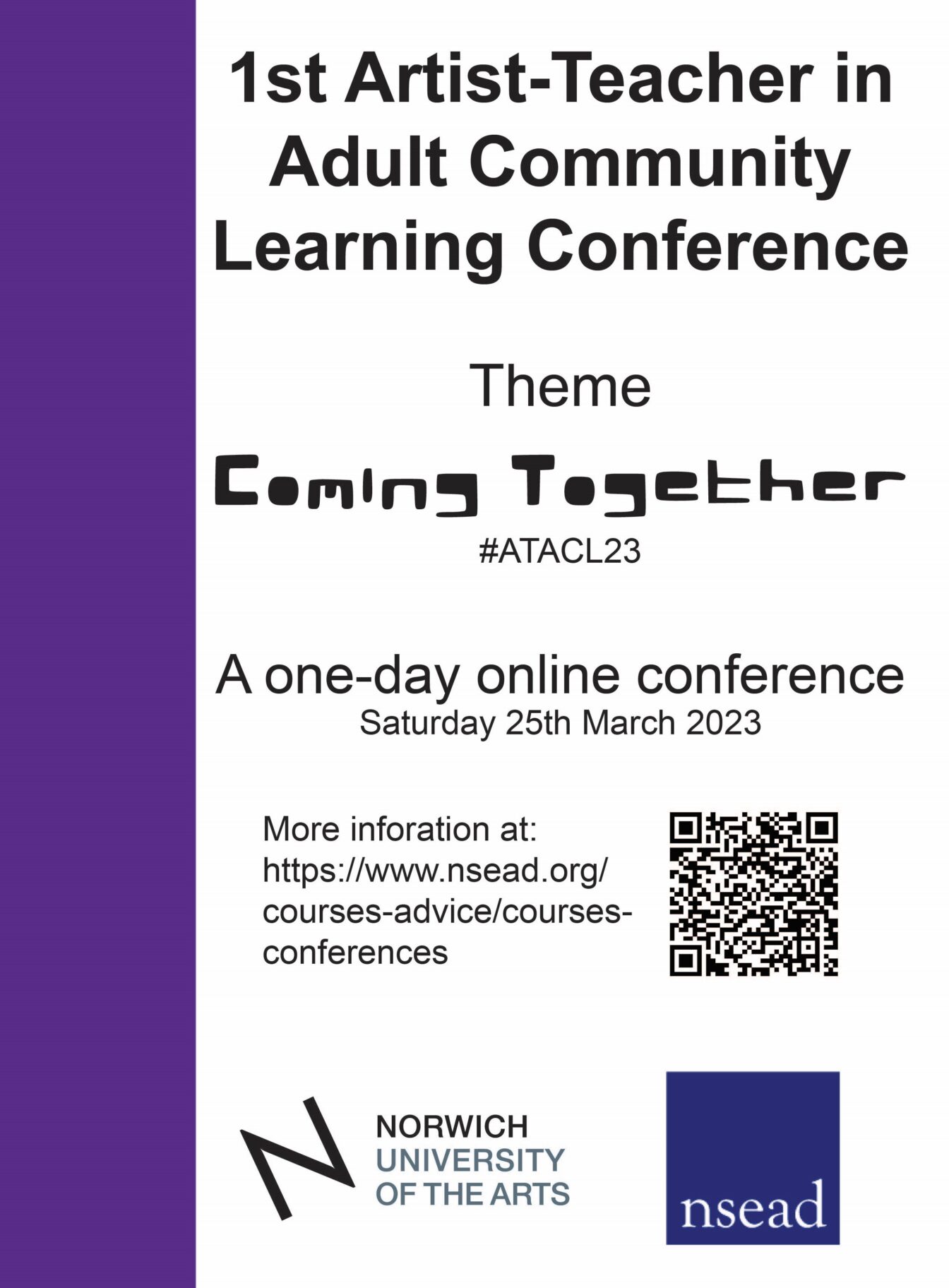

Late last year, in November 2022, I joked to my supervisor that I should put on a conference for artist-teachers who teach in adult community learning (ACL). On Saturday 25th March, this joke will become a reality. While the suggestion started as something quite tongue-in-cheek, in response to the lack of a conference of this kind not already existing, at its heart is a serious matter. The Department for Education (2018) and Lave and Wenger (1991) outline that there can be negative effects on teacher identity if they do not have access to others in the same profession, as they are “left to develop subject and occupational expertise in isolation” (DfE, 2018:13). This conference aims to address this and create a space in which subject and occupational expertise can be developed with a community of other teachers, working in the same subject area and educational sector.

I wanted to put a conference together as my lived experience and research suggested that artist-teachers tend to be isolated – and from wider reading, this is true for other teachers too, more notably those with subject specialisms (Thornton, 2013:167) or those working part-time (Daichendt, 2010:133).
For artist-teachers, the experience of embodying this identity can be “lonely and precarious” (Zwirn, 2009:15). However, it is reported that continued professional development (CPD) and communities of practice (CoP) activities such as attending conferences can have a powerful impact on “combat[ing] isolation” (Matthews, 2019:862), for artist-teachers it has been shown how bringing groups together in this way create spaces for creative and emotional support” (2019:862). Without this, teachers may feel excluded from membership of the community they belong to (Hofsess, 2015:3), which can stunt their legitimate peripheral participation (Graham and Estrada, 2019:20-21), and how they identify.
However, access to CPD and CoP is not always guaranteed, with some teaching professionals lacking the opportunity for casual encounters with others carrying out the same job as them, in which cases more organized meetings may be required (Wenger, 2000:258). Here virtual opportunities, such as the 1st Artist-Teacher in ACL Conference, come into play. Virtual communities of practice (VCoP) are beneficial for artist-teachers facing isolation at work (Adams, 2007), as they provide a space for conversations about their common interest (Wenger, 2000:258) and help to connect artist-teachers who would otherwise be working in isolation (Sweeny, 2016:7).
If you would like to learn more about the 1st Artist-Teacher in ACL Conference, visit the link below.
https://www.nsead.org/courses-advice/courses-conferences/adult-community-learning-conference/
Adams, J. (2007) ‘Artists Becoming Teachers: Expressions of Identity Transformation in a Virtual Forum’, International Journal of Art & Design Education, 26(3), pp. 264–273. doi: 10.1111/j.1476-8070.2007.00537.x.
Daichendt, G. J. (2010) Artist-Teacher: A Philosophy for Creating and Teaching. Bristol: Intellect.
Department for Education (2018) Teaching, Leadership and Governance in Further Education Research Report. Available at: https://assets.publishing.service.gov.uk/government/uploads/system/uploads/attachment_data/file/680306/Teaching__leadership_and_governance_in_Further_Education.pdf. (Accessed 05 January 2023).
Graham, M. A. and Estrada, T. C. (2019) ‘Contemporary artist/teacher meets a mid-century classroom: Practice, theory and becoming an art teacher,’ Visual Inquiry: Learning & Teaching Art, 8(1), pp. 9–24. doi: 10.1386/vi.8.1.9_1.
Hofsess, B. A. (2015) ‘The Map of True Places: Moving Onward in Artist-Teacher Preparation,’ Visual Arts Research, 41(1), p. 1. doi: 10.5406.41.1.0001.
Lave, J. and Wenger, E. (1991) Situated Learning: Legitimate Peripheral Participation. Cambridge University Press.
Matthews, M. (2019) ‘Ethos of Ambiguity: Artist Teachers and the Transparency Exclusion Paradox,’ International Journal of Art & Design Education, 38(4), pp. 853–866. doi: 10.1111/jade.12277.
Sweeny, R. (2013) ‘Editorial: Teaching ART, Teaching ARTISTS, Teaching ART TEACHERS,’ Art Education, 66(3), pp. 6–7.
Thornton, A. (2013) Artist, Researcher, Teacher: A Study of Professional Identity in Art and Education. University of Chicago Press.
Wenger, E. (2000) Communities of Practice: Learning Meaning and Identity. Cambridge, University of Cambridge Press.
Zwirn, S. G. (2009) ‘Seeking Causes for Marginalisation of the Arts in American Education. Critical Perspectives on Communication,’ Cultural and Policy Studies, 28(1), pp. 15-25.